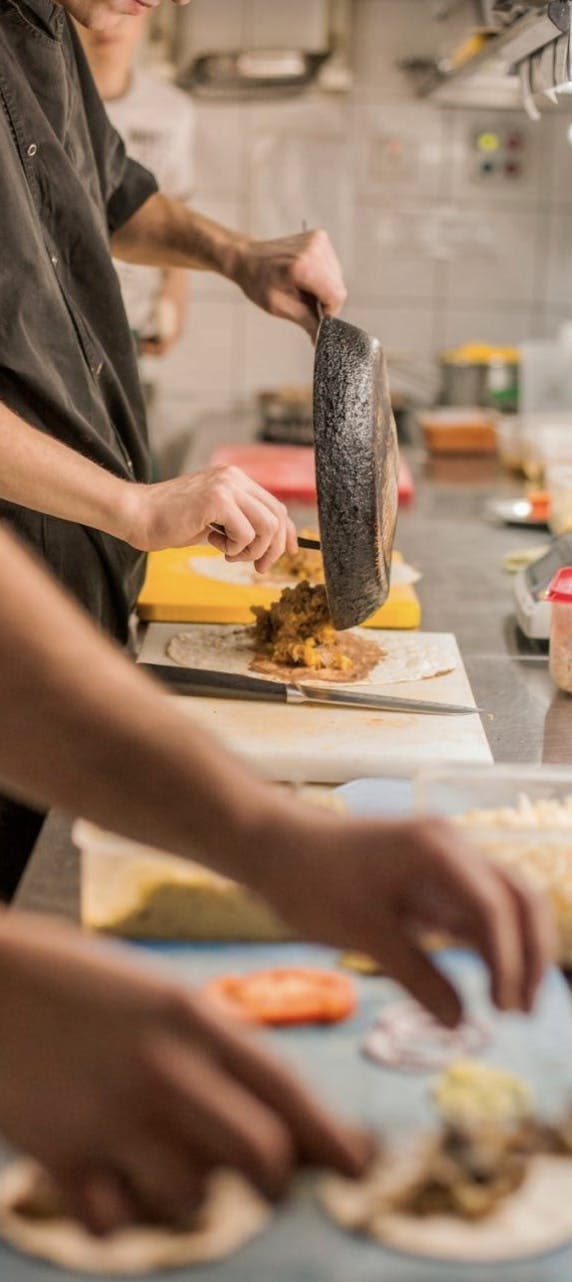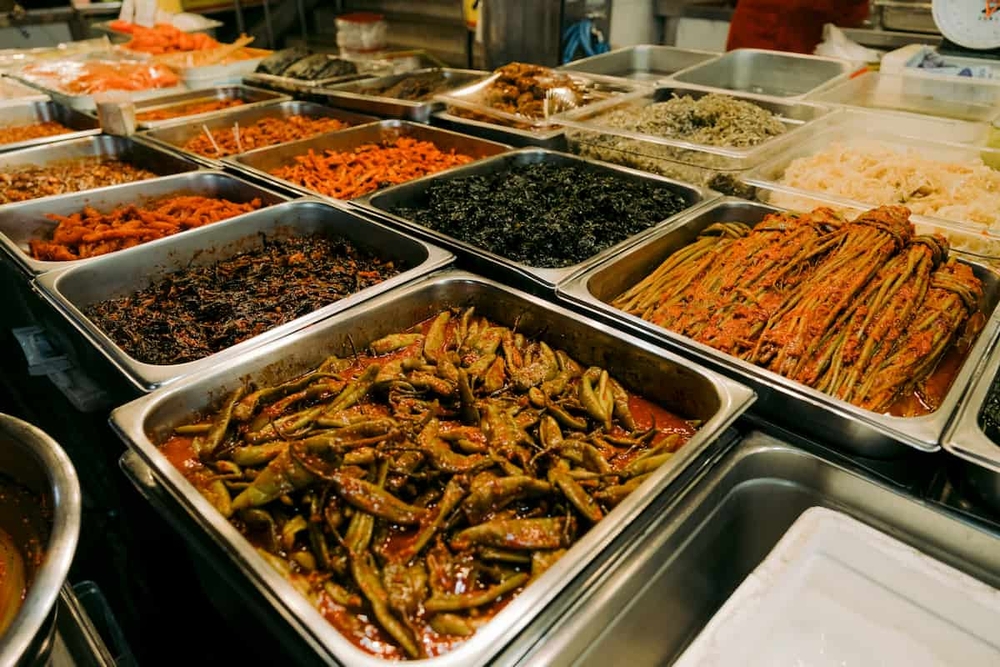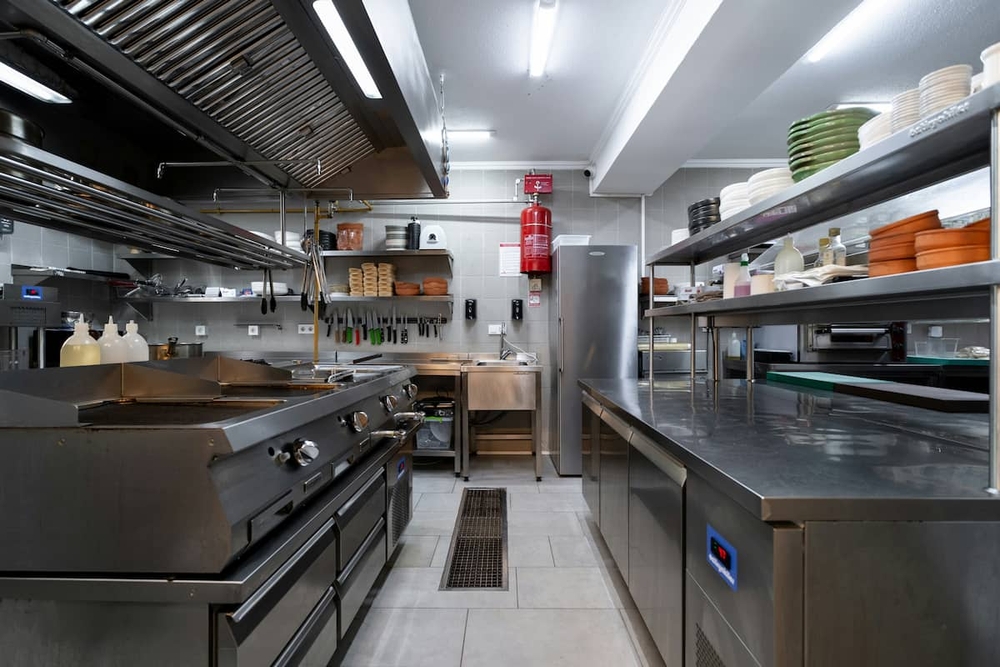How event catering kitchens can help you handle large-scale events
Table of Contents
CloudKitchens
How many tacos can be delivered from a 1000sqft restaurant?
The same amount as a 200sqft ghost kitchen.
Managing food service for a large-scale event requires extensive planning, efficient execution, and the right kitchen setup. Whether it’s a corporate gala, wedding, festival, or conference, event caterers must ensure food quality, consistency, and timely delivery.
This is where event catering kitchens play a crucial role. These specialized kitchens are designed to handle high-volume meal production while maintaining efficiency and compliance with food safety regulations.
Event catering kitchens provide a structured environment equipped with commercial-grade appliances, ample storage, and optimized workflows to accommodate large orders. We will explore how these kitchens support large-scale events and why they are essential for professional caterers.
Why event catering kitchens are essential for large events
Successfully catering a large event requires more than just skilled chefs and a great menu; it demands a well-equipped and efficient kitchen setup. Event catering kitchens provide the necessary infrastructure to handle high-demand cooking, streamline workflows, and ensure food is prepared and served on time.
These specialized kitchens help caterers manage bulk meal production while maintaining food quality, hygiene, and organization.
1. High-volume food production
Large-scale events often require preparing hundreds or even thousands of meals in a short time. Event catering kitchens are equipped with industrial-sized appliances, such as high-capacity ovens, large refrigeration units, and bulk food preparation stations, allowing caterers to efficiently produce food at scale.
Key benefits:
- Ability to cook and assemble large quantities of meals simultaneously
- Efficient handling of multiple meal courses and dietary preferences
- Reduced risk of service delays due to inadequate kitchen capacity
Read more: Essential Guide to Industrial Kitchen Equipment for Ghost Kitchens
2. Streamlined kitchen workflow
A well-designed catering kitchen optimizes food preparation processes, minimizing bottlenecks and ensuring a seamless workflow. Proper kitchen layout, designated prep stations, and workflow management tools help staff work efficiently.
Workflow improvements:
- Organized food prep stations for different menu items
- Streamlined order management systems to track meal production
- Efficient movement between storage, prep, cooking, and plating areas
3. Food quality and consistency
Ensuring food tastes great and looks appealing is vital for large-scale catering. Event catering kitchens utilize standardized recipes, temperature-controlled storage, and quality control procedures to maintain consistency across all dishes.
Quality control strategies:
- Batch cooking techniques to ensure uniform flavors
- Temperature monitoring systems to prevent spoilage
- Pre-plated meal assembly for uniform portioning
Read more: Service quality in catering: best 10 practices for success
Key challenges of catering for large events and how kitchens help
Catering for large-scale events presents a unique set of logistical and operational challenges, from maintaining food quality to serving meals on time. Without the right kitchen setup, managing these challenges can become overwhelming.
Event catering kitchens are designed to alleviate these concerns by providing a controlled environment that enhances efficiency and precision in food preparation and service.
1. Managing time-sensitive meal service
Catering for large events involves serving hundreds of guests within a set timeframe. Event catering kitchens are equipped with tools like hot-holding units, high-speed ovens, and pre-assembly stations to facilitate timely service.
Solutions:
- Advanced scheduling to align cooking times with event timelines
- Use of warmers and insulated storage to maintain food temperature
- Strategic plating stations for quick meal assembly
2. Handling diverse menu requirements
Guests at large events have varied dietary preferences, including vegetarian, gluten-free, and allergy-friendly meals. Event catering kitchens enable efficient preparation and separation of specialized meals without cross-contamination.
Solutions:
- Dedicated prep areas for allergen-sensitive dishes
- Pre-labeled ingredient storage for quick identification
- Clear communication between chefs and serving staff
3. Scaling operations without sacrificing quality
Scaling up meal production while maintaining quality is one of the biggest challenges in catering. Event kitchens optimize ingredient storage, automate repetitive tasks, and improve order tracking to ensure smooth operations.
Solutions:
- Smart inventory management to prevent shortages
- Automated cooking equipment to maintain consistency
- Pre-portioned ingredients to speed up meal prep
Read more: Maximizing efficiency: how catering software solutions can streamline your business operations
Best practices for using event catering kitchens effectively
To maximize efficiency in event catering kitchens, caterers should follow these best practices:
Plan the menu strategically
Choose dishes that can be prepped in advance without compromising quality. Opt for menu items that can be batch-cooked and held at optimal serving temperatures without losing texture or flavor. Selecting versatile ingredients that can be used across multiple dishes can also help reduce waste and streamline production.
Invest in high-capacity equipment
Utilize commercial-grade appliances such as high-speed ovens, blast chillers, and automated cooking stations to speed up food production while maintaining quality. Large mixers, multi-burner ranges, and conveyor belt ovens can also enhance efficiency, allowing for smoother kitchen operations.
Train staff for efficiency
Ensure catering staff follows standardized procedures to minimize errors, improve coordination, and optimize workflow. Conducting regular training sessions on time management, portion control, and food safety can significantly enhance kitchen performance.
Use smart storage solutions
Organize ingredients and prepare meals efficiently to prevent food waste, streamline retrieval, and maintain proper food safety standards. Implementing a labeling system and using clear containers for easy identification can further enhance storage organization.
Implement real-time tracking
Use order management systems to monitor preparation and service progress, allowing quick adjustments to meet demand fluctuations. Integrating kitchen display systems (KDS) can also help synchronize communication between chefs and serving staff.
Optimize kitchen layout
Designate specific areas for prep, cooking, plating, and packaging to minimize movement and increase efficiency. A well-organized kitchen layout reduces congestion and enhances workflow by ensuring that every process has a dedicated space.
Incorporate food safety measures
Ensure compliance with food safety regulations by maintaining proper sanitation, temperature control, and allergen management protocols. Regular health and safety inspections, as well as proper food handling training, can help maintain high hygiene standards.
Utilize portion control methods
Pre-portion ingredients and meals to ensure consistency, minimize waste, and streamline plating during service. Measuring tools such as portion scoops, weighing scales, and portion bags can help standardize servings across all meals.
Develop contingency plans
Have backup strategies for equipment failures, staff shortages, and ingredient substitutions to prevent service disruptions. Keeping a list of alternative suppliers and cross-training staff for multiple roles can help mitigate unexpected challenges.
Leverage technology
Use digital kitchen management tools to enhance efficiency, track inventory, and improve overall kitchen coordination. Automated ordering systems, AI-driven inventory tracking, and digital recipe management tools can all contribute to a smoother operation.
Read more: Catering licenses and permits
Scale your catering business with CloudKitchens
Event catering kitchens are essential for handling the complexities of large-scale food service. They enable caterers to prepare high-quality meals efficiently, manage diverse dietary needs, and streamline operations for smooth event execution. With the right kitchen setup, caterers can confidently take on large-scale events without compromising service quality.
CloudKitchens provides state-of-the-art commercial kitchens designed to support large-scale event catering. Our flexible kitchen spaces, high-capacity equipment, and streamlined operations help caterers expand their services and handle high-volume events effortlessly.
Ready to elevate your catering operations? Explore our catering kitchen solutions!
DISCLAIMER: This information is provided for general informational purposes only and the content does not constitute an endorsement. CloudKitchens does not warrant the accuracy or completeness of any information, text, images/graphics, links, or other content contained within the blog content. We recommend that you consult with financial, legal, and business professionals for advice specific to your situation.
More insights & stories
There’s more where that came from.
Get in the know and check out our additional insights


